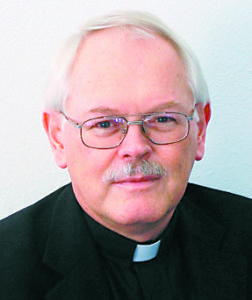
Father Ron Rolheiser, OMI
IN EXILE
By Father Ron Rolheiser, OMI
God, it seems, favors the powerless, the unnoticed, children, babies, outsiders and refugees with no resources or place to go.
That’s why Jesus was born outside the city, in a stable, unnoticed, outside all fanfare, away from all major media and away from all the persons and events that were deemed important at the time, humble and anonymous. God works like that. Why?
In the rock opera, Jesus Christ Superstar, that question is asked of Jesus: Why’d you choose such a backward time in such a strange land? If you’d come today you could have reached a whole nation. Israel in 4 BC had no mass communication.
Scripture answers by telling us that God’s ways are not our ways and our ways are not God’s ways. That’s true here. We tend to understand power by how it works in our world. There it works through popularity, through mass media, through historical privilege, through financial clout, through higher education, through idiosyncratic genius, and, not infrequently, through raw aggression, greed and insensitivity to the needs of others and of nature.
But even a quick reading of scripture tells us that’s not how God works. The God that Jesus incarnates doesn’t enter into this world with a huge splash, as a royal birth eagerly anticipated and then announced by all the major media outlets, with photos of him and his parents on the cover of every popular magazine, with universal predictions as to his future greatness and influence, and then with privileged access to the best educational institutions and circles of power and influence.
Clearly, clearly, that’s not the story of Jesus’ birth, nor of how his life unfolded. God, as scripture shows, works more through anonymity than through the headlines, more through the poor than the powerful, and more through those outside the circles of power than those inside them. When we examine how God works, we see it’s no accident that Jesus was born outside the city and that after he was crucified he was also buried outside the city.
God’s work in our world generally does not make the headlines. God never breaks into our world or into our consciousness by showy displays of power. God works more discretely, in quiet, touching soul, touching conscience and touching that previously touched part inside of us where we still unconsciously bear the memory of once, long before birth, being touched, caressed,and loved by God. That’s why Christ was born into this world as a baby and not as superstar, as someone whose only power was the capacity to touch and soften the hearts of those around him. Babies overpower no one, physically, intellectually, or athletically. They lie helpless and cry for love and care. That’s why, paradoxically, at the end of the day, they’re more powerful than anyone else. No physical, intellectual or athletic power can ultimately touch the human conscience as can a baby – and similar sights of innocent helplessness, a wounded bird, an abandoned kitten, a young child alone and crying. What’s best in us enflames, healthily, in the presence of powerlessness and innocence.
That’s how God enters into us, gently, unnoticed. No big splash. That’s also why God tends to bypass circles of power to favor the abandoned and vulnerable. For example, when the Gospel of Luke records how John the Baptist came to be specially blessed, it takes a scathing swipe at both the civic and religious powers of its time. It names all the major civil and religious leaders of the time (the Roman rulers, the kings in Palestine, and the religious high priests) and then tells us plainly that the word of God bypassed them all and came instead to John, a solitary, living in the wilderness. (Luke 3, 1-3) According to the Gospels, the wilderness is where we’re most likely to find and experience God’s presence because God tends to bypasses the centers of power and influence to find a place instead in the hearts of those outside those circles.
You see this too, though admittedly without the same theological weight as is manifest in scripture, in the various apparitions of Mary, Jesus’ mother, that have been approved by the church. What’s common to all of them? Mary has never appeared to a president, a pope, a major religious leader, a Wall Street banker, the CEO of a major company or even to an academic theologian in his study. None of these. She’s appeared to children, to a young woman of no earthly importance, to an illiterate peasant and to various other persons of no worldly status.
We tend to understand power as residing in financial influence, political clout, charismatic talent, media influence, physical strength, athletic prowess, grace, health, wit, and attractiveness.
On the surface, that assessment is accurate enough, and indeed none of these are bad in themselves. But, looked at more deeply, as we see in the birth of Christ, God’s word bypasses the centers of power and gestates instead in the hearts and consciences of those outside the city.
(Oblate Father Ron Rolheiser, theologian, teacher and award-winning author, is President of the Oblate School of Theology in San Antonio, TX.)
